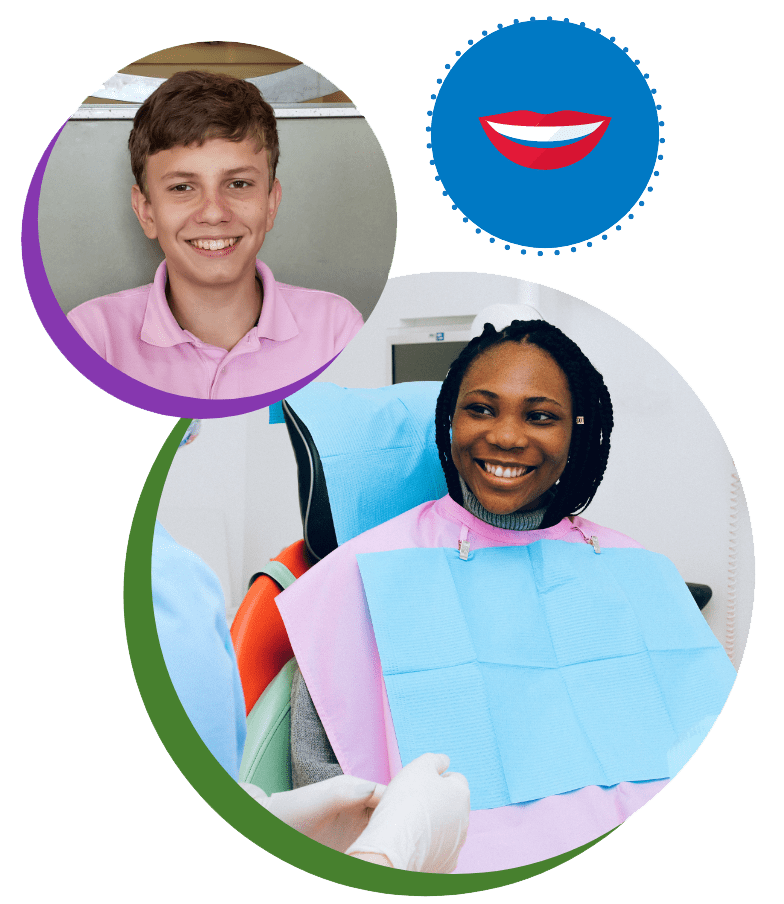Oral Surgery
COMPLETE CARE FOR YOUR FAMILY
When a child needs oral surgery, moms & dads will have questions. We’ve got answers. Team members are here to answer all of your questions — leading to brighter futures.
common Types of oral surgery
Our doctors and team members are here to answer all your questions about everything Oral Surgery.
Oral surgery is surgery that is performed in or around your mouth & jaw, leading to complete transformations in the lives of patients. At Taylor Dental, our providers perform procedures in a safe, controlled environment, with infection control standards.
The most common oral surgery (also known as maxillofacial surgery) our providers can help with:
- Tooth Extraction
- Impacted wisdom teeth
- Gum graft
- Dental implants
- Root canal
- Jaw Problems related to injury, TMJ, or misalignment

Questions and Tips About Oral Surgery
Why would my child need Oral Surgery?
If your child has a problem that our general dentist cannot treat, they may require oral surgery. For example, if their wisdom teeth are impacted, they’ll likely need oral surgery. Our dentists will talk to you about the oral surgery needed. We can perform most wisdom teeth extractions with our trained providers & team members & anesthesiologists. If your child (or yourself) require a type of surgery that we do not perform, then we will refer you to a surgery center.
Avoid these things for after your oral surgery
Not avoiding these things can cause the clot to dislodge & cause dry socket.
- Avoid rinsing or spitting in first 24 hours
- Avoid any sucking, such as using straws or smoking
- Avoid Hot liquids for 24 hours
- Avoid food until all the numbness from anesthesia has worn off. Afterwards, your child should stick to soft food for the first few days
- Adults – Avoid alcohol if you are taking narcotic pain medication (prescribed by your doctor)
How do I prepare my child for oral surgery?
Oral surgery doesn’t need to be filled with unknowns. The better you prepare you prepare your child, the more comfortable they will feel.
- Start by discussing the procedure with your child so they can know what to expect.
- Ask your dentist any questions you may have, including what to expect during the procedure & the recovery time & normal parts of physical recovery.
- Then, think about the space that your child will return to. Make their space comfortable & surround with comforting & familiar things. Make sure their bed is inclined with pillows if needed.
- Follow the pre-surgery instructions your provider gives to you. Your child may be asked to fast for 6 hours or longer before surgery, meaning they cannot eat or drink anything before the procedure.
- Make sure your child has an adult with them to wait for them during the operation & to give them a ride after the procedure.
wisdom teeth
What are wisdom teeth?
Wisdom teeth are the last set of molars to come in, in the back of the mouth. A child’s wisdom teeth can start to make an appearance in their late teens or early adulthood years. If properly aligned & healthy, wisdom teeth may not be an issue, but more often, wisdom teeth are misaligned & can cause pain, damage to other teeth or nerves, bad breath & cysts. Therefore, wisdom teeth will likely need to be removed.
Your Louisiana dentist will be able to recommend when your child should have their wisdom teeth removed before any problems arise. Not everyone gets wisdom teeth, but most people will get four in total.
How Do I Know if my child has wisdom teeth?
Your child’s dentist will be able to tell you where your child’s wisdom teeth are positioned. He or she will likely take an X-Ray to evaluate the best time to get your child’s wisdom teeth removed. Typically, wisdom teeth are removed before they erupt & when the roots are not yet fully developed. Removal early generally means less pain & a quicker recovery time.
What Happens During Wisdom Teeth Removal?
Typically for wisdom teeth removal, a local anesthesia is administered to the surrounding tissue & teeth to numb the area near the extraction. Additionally, we will typically give a sedative, such as nitrous oxide (laughing gas) to control anxiety.
General Anesthesia
There are different types of anesthesia, for different purposes. Conscious sedation & General Anesthesia. Your dentist will help you decide which is best for you & your family if necessary.
Conscious sedation involves use of medications, including intravenous drugs to help reduce anxiety & fear when patients are having certain types of surgery, such as removal of wisdom teeth.
General Anesthesia is a combination of intravenous drugs & inhaled gasses that put you in a sleep-like state during surgery for extensive treatment. If your child needs to go under general anesthesia, they won’t feel any pain because they will be unconscious. An anesthetized brain doesn’t respond to pain signals or reflexes.
If your child requires oral surgery & they are having the procedure done here in our office, then the general anesthesia will be administered in our Taylor Dental office by an anesthesiologist. An anesthesiologist is a specially trained to administer anesthesia. During your child’s surgery, the anesthesiologist will be with them the entire time to monitor their body’s vital functions & breathing.
Before your child’s surgery
Before your child’s surgery, you’ll meet with their dentist to discuss their medical history, medications & how to prepare for their procedure.
Preparing for your child’s procedure
Fasting for at least 6 hours is usually required. However, they may be able to drink clear fluids until a few hours prior. They may need to avoid some medications, such as aspirin & some other over-the-counter blood thinners, for at least a week before their procedure. Also, some vitamins & herbal remedies, have been known to cause complications during surgery. Discuss any medications & vitamins or dietary supplements with your child’s dentist.
After Surgery
After your child’s oral surgery, the anesthesiologist will reverse the medications to wake them up. Afterwards they may feel a little confused or a little groggy. They may experience other side effects such as: nausea, vomiting, dry mouth, sore throat, muscle aches, Itching, shivering, sleepiness, mild hoarseness.
Risks
Although considered very safe, as with any drugs, there are some risks associated with general anesthesia. If your child has medical complications or health risks, be sure to discuss these things thoroughly with your dentist. Confusion, pneumonia, stroke or heart attack are very rare risks. There’s a risk of 1-2 in 1000 of being partially awake during a procedure which is called Anesthesia Awakening. For complete information on risks associate with general anesthesia, visit mayoclinic.org.
FREQUENTLY ASKED QUESTIONS
Wisdom teeth or third molars, are the last adult teeth to come in or erupt in the mouth. Most people will have 4, 2 on top and 2 on the bottom. They usually come in when you’re older, around the ages of 17-21.
After surgery, most people experience little to no pain. You’re likely to have slight discomfort and swelling for 3-5 days and it may take up to a few weeks for your mouth to completely heal. For the best recovery, be sure to follow your doctor’s home care instructions.
After surgery, your child will likely experience some slight discomfort and swelling for 3-5 days and it may take up to a few weeks for your mouth to completely heal. For the best recovery, be sure to follow your doctor’s home care instructions. If you have any questions during your child’s recovery, be sure to contact your dentist.
First, always follow your doctor’s instructions on home care after surgery. Some other helpful tips:
- Rest – Take it easy and rest at home. Try to avoid any strenuous physical activity.
- Ice – You can use ice packs for 10-15 minutes on, and 10-15 off to help with swelling.
- Carefully brush – Continue brushing and flossing normally but, do so carefully as to not disrupt any healing that your body is to do.
- Eat soft foods – For the first few days of recovery, try to eat only soft foods like soups, yogurt, or mashed potatoes.



